Translated by Hanna Safieh
It is evident that the main actors engaged in ending the foreign occupation of Palestine are those of us who physically remain in geographic and historical Palestine, closely followed by those who are living the misfortune of dwelling in refugee camps in adjacent countries. But we should not forget the important and irreplaceable role of the Palestinian communities that live far from the motherland in the so-called diaspora, also called the expatriate population. For their engagement to be effective, however, these communities must be well organized and connected to the Palestinian state and resistance institutions, particularly the Organization for the Liberation of Palestine (PLO).
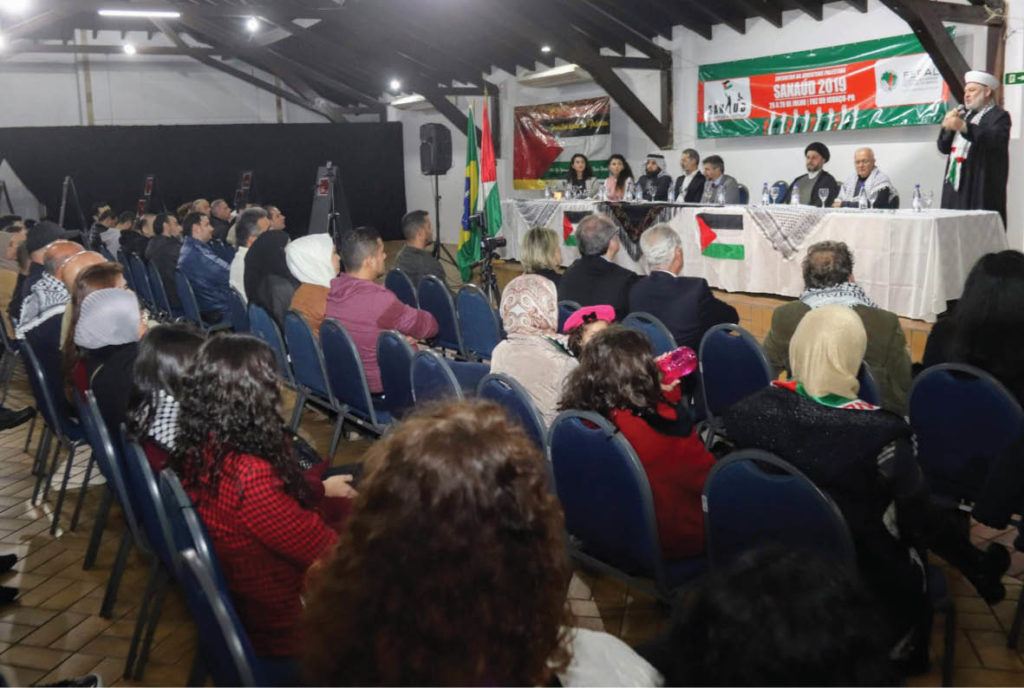
According to accepted estimates, the Palestinian population approaches 14 million, close to 0.2% of the world population. Moreover, despite the brutal, previously planned and methodically executed ethnic cleansing of 1948, we are again the majority in historical Palestine. Close to 7.1 million Palestinians inhabit this geographic area, 5.3 million in the so-called West Bank and Gaza and an estimated 1.8 million in the land taken in 1948. The other around 7 million Palestinians live, mainly as refugees, in the countries of the region, in the Arab countries, as well as all over the world. It is estimated that around 700 thousand persons with Palestinian lineage live in Latin America; some say that this estimate includes the United States and Canada, whereas others claim that the Palestinians living on the entire American continent exceed 1 million.
The diaspora communities play an important role in efforts to bring about the liberation of Palestine. This is true also for the communities in Brazil where, due to a change in political climate, new urgently needed organizational models are being established.
Since the 1970s, it has been widely acknowledged that the Palestinian communities that reside outside Palestine and beyond the Middle East play an important role in the fight against the occupation. For this reason, numerous movements and organizations to unite the diaspora communities have been launched, supported by the PLO. In Brazil, where the Palestinian community may number 70 thousand members, dozens of Palestinian societies have sprung up. Originally, they were composed mostly of immigrants, since their organization started among expatriates who had recently arrived in Brazil, and extended to the new Palestinian-Brazilian generation that was just beginning to be born.
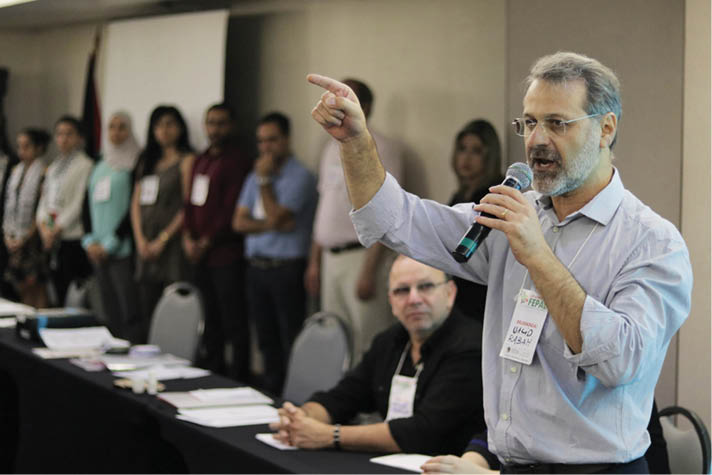
The first community meeting of national character and with a view towards organizing a general Palestinian entity took place in 1979 in Brazil’s federal capital, Brasília. In the following year, the first congress of the Palestinian Arab Federation of Brazil (FEPAL) was held in Porto Alegre, the capital city of Rio Grande do Sul, the southernmost Brazilian state where most of the Palestinian-Brazilian community is concentrated. Other organizations sprang up, to varying degrees and with varying success, in other countries on the continent, calling themselves societies and federations.
The big question is always: What is the purpose of these these communities? As a rule, the answer seems simple: To preserve traditions, culture, and language, keep a connection to Palestine, and, of course, be part of the resistance. To a large extent, that has been achieved. Without these communities, we would no longer have even residual traces of what we call “Palestinism” amongst many Palestinian expatriates.
Special factors facilitated the setting up of these community organizations in the early days. First: the Palestinians targeted by these initiatives tended to be newcomers to Brazil. This facilitated both, approaching them in terms of the Palestinian question and communication in Arabic, still spoken by many back then. Second – this reason not always being properly perceived – as practically everyone was engaged in retail at the time, Palestinian shops in any Brazilian city tended to be located in a central commercial region. Thus, within just a few minutes, one or two streets were covered, and the entire community was found. Easily one could either communicate the date of a meeting, collect funds, or circulate information.
But this situation has changed due to the uniquely continental reality of Brazil’s Palestinian expatriate community. Whereas almost half of this community is concentrated in one state, the other half is spread throughout remaining Brazil, a country of more than 8 million sq km. The distances between the important communities in the north and northeast and those in the south reach from 4,300 to 4,900 km. Even communities considered “close,” such as São Paulo (southeast) and Porto Alegre (south), are 1,100 km apart. And to travel between the two main communities located in the northeast (Recife) and north (Manaus), one must cover 2,800 km by air or 5,600 km by land.
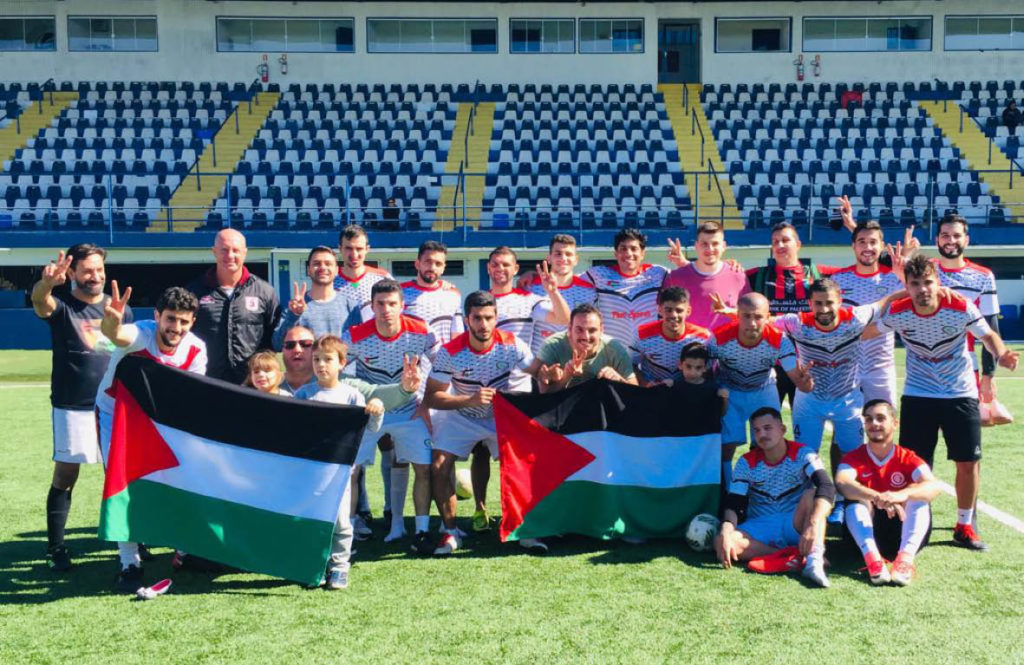
This problem has always existed, however, and makes the current level of organization among the Palestinian community in Brazil even more commendable, especially when compared to other countries on the continent that are much smaller and where communities tend to be concentrated in only one region, sometimes even in one city. The biggest problem today is the change in the level of awareness and involvement found among the new generations, when compared to the first, immigrant generation.
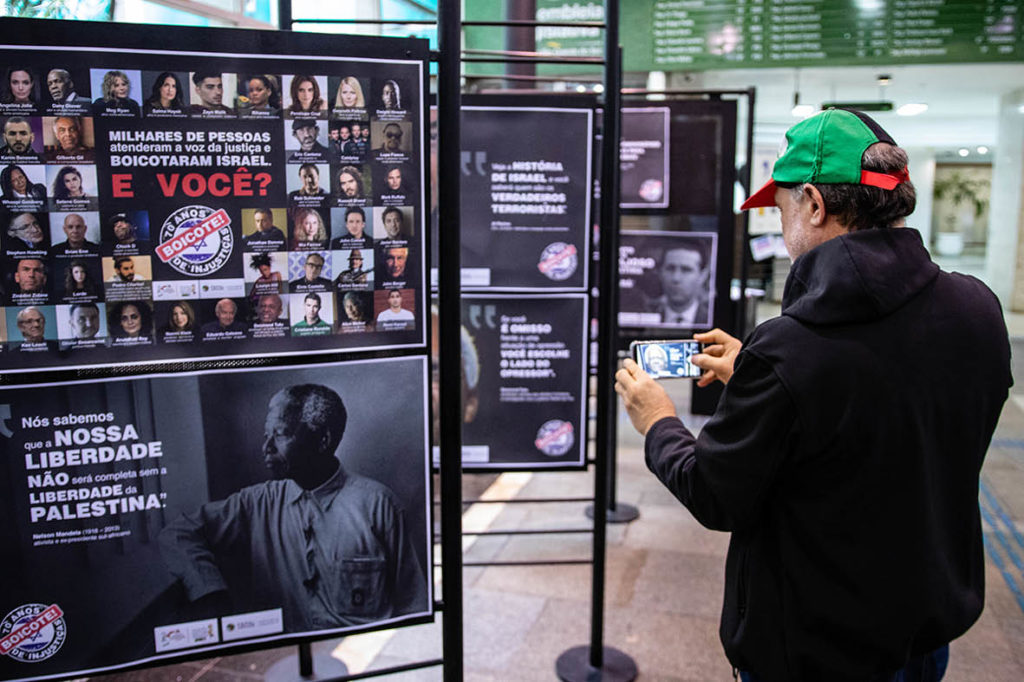
The Arabic language is no longer spoken, which has caused the loss of connections with Palestine, both among family members and as a source of inspiration and information. Moreover, most Palestinian-Brazilians are no longer traders, nor are they located on more or less one street. Today, they are professionals who work in various fields and are spread over the entire country. Many (in some regions, the majority) are not particularly concerned with Palestinian issues, let alone connected with Palestinian organizations and leaders; they do not know the history of Palestine or its liberation movement. Most of them have children, sometimes even grandchildren, who were born in Brazil and whose attitudes regarding Palestine and its cause are even more precarious.
The situation is delicate in the Palestinian expatriate community in Brazil. Its gravity becomes even greater when considering the challenges it is faced with and must overcome. The first task is to revive contacts within and among the communities, organizing them and inserting them into the Palestinian context. In other words, we must re-Palestinize the generations born here. The second task is to organize the community, i.e., integrate this community with the Palestinian-Brazilian institutions. And the third is to find ways to turn Palestinian-Brazilians into activist, militants of human rights and the Palestinian cause, and thus form the new cadres necessary for the maintenance of our identity, the continuation of the national struggle, and the preservation of Palestinian institutions, culture, and heritage.
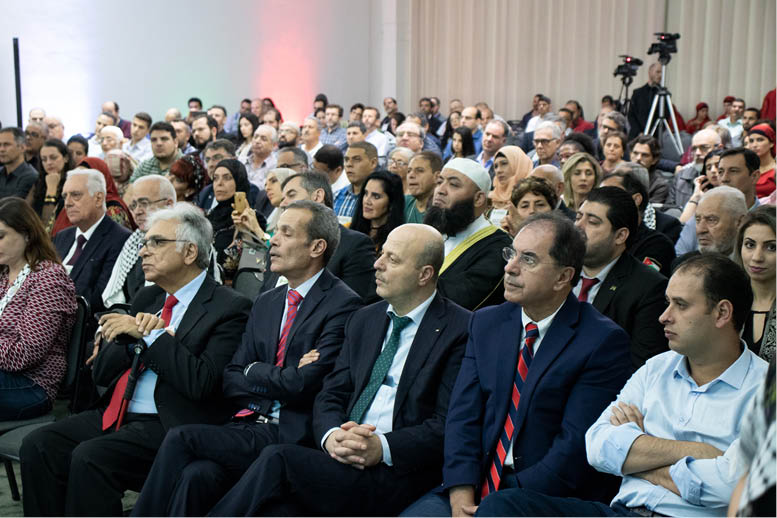
Some first steps have already been taken. One of them, very importantly, is the rescue of the youth organization. Already, it has held informative sessions, including a specific plenary session at the 10th FEPAL Congress (held from April 26 to 28, 2019) followed by a regional meeting that included dozens of participants. Also, a youth secretariat was created at the congress as part of FEPAL’s executive committee. In another important step, Palestinian-Brazilian women organized themselves, also holding a special plenary session at the 10th FEPAL Congress and creating an unprecedented women’s secretariat – that at this time is preparing the first women’s meeting in Brazil. Increased attention has been given to refugees, which has led to the creation of yet another exclusive secretariat in FEPAL’s executive committee.
Prior to the 10th FEPAL Congress, we already sought to organize the community by professional affinities. Thus, a collective of jurists of Palestinian origin was born, another one of health professionals, and one of technology experts. In the midst of the 10th Congress, a group was born that brings together Palestinians and their descendants involved in public service.
These have been and remain formulas that render effective efforts that aim to recover FEPAL’s ties with its community members, also attracting them to the cause – judging by the successful 10th Congress in which many of the delegates were elected from the grassroots due to new organizational methods. All these developments made this event the largest Palestinian-Brazilian meeting in history. Another highlight: 40 percent of FEPAL’s new board is made up of women, another unprecedented development in our history.
A challenge that has intensified in recent years, with severe setbacks for the Palestinian cause, is the change of political climate in Brazil. It has affected also the Brazilian-Palestinian community, its society and institutions and their relations to Brazilian society, political parties, governments, parliaments, media, and other social organizations. We need a new and reinvigorated strategy, both politically and socially, in order to face and overcome this new adverse situation. As outlined above, efforts towards this end are underway.
Notable is the potential impact of the Palestinian-Brazilian community, given Brazil’s strategic importance on the continent, seconded only by the United States. Brazil is a leader in Latin America and the Caribbean and an integrating actor in BRICS, the association of five major emerging national economies that includes Brazil, Russia, India, China, and South Africa. It is one of the largest countries in terms of territory and population and one of the largest economies on the globe. In addition, Brazil has one of the largest Arab emigree communities in the world – a significant factor in terms of sympathies with the Palestinian cause and regarding the organization of its expatriate community.
To increase the effectiveness of our advocacy and fight for our national cause, simple methods are available, some of which are already being applied. We now have to follow up and improve them. Let us not waste our energies and times on fratricidal distractions.
In this larger context, we must consider the importance of Brazil and its Palestinian community. Into this framework we must place the work we can carry out, whether through FEPAL, the PLO, or the Palestinian government. New strategies must be designed and methodically applied. Delegations should visit Brazil to meet both high-level Brazilian political, social, and religious authorities and leaders as well as members of our Palestinian community, both to raise their morale and to make them fellow protagonists in addressing the cause.
Simple initiatives can quickly improve the current situation in Brazil. One of them, not very complicated yet very important, is related to communication. It is essential and urgent that all official Palestinian websites and communication, whether issued by the state or resistance-related institutions and others, be published in Portuguese and Spanish. In this way, messages may reach and be understood by almost the entire continent as well as by speakers of these two languages in Europe and Africa. In other words: we can increase our reach and communicate, beyond our own expatriate communities, with an audience of hundreds of millions of people who do not speak Arabic or English. There is untapped potential. Let us access it.



